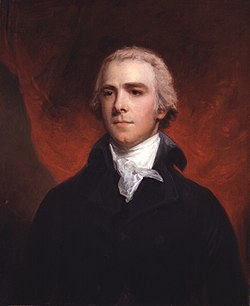History
With the country remaining at war, Grenville aimed to form the strongest possible government and so included most leading politicians from almost all groupings, although some followers of the younger Pitt, led by George Canning, refused to join.
The inclusion of Charles James Fox surprised some as King George III had previously been very hostile to Fox, but the King's willingness to put aside past enmities for the sake of national unity encouraged many others to join or support the government as well. The ministry boasted a fairly progressive agenda, much of it inherited from Pitt.
The Ministry of All the Talents had comparatively little success, failing to bring the sought-after peace with France. In fact, the war continued for nearly another decade. It did, however, abolish the slave trade in Britain in 1807 before breaking up in 1807 over the question of Catholic emancipation.
It was succeeded by the Second Portland ministry, headed by William Cavendish-Bentinck, 3rd Duke of Portland.
This page is based on this
Wikipedia article Text is available under the
CC BY-SA 4.0 license; additional terms may apply.
Images, videos and audio are available under their respective licenses.



